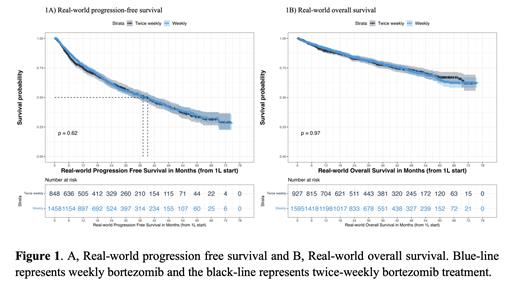Introduction: Most induction regimens for multiple myeloma (MM) contain bortezomib. In most clinical trials, bortezomib has been prescribed either intravenously or subcutaneously twice per week in 21-day or 28-day cycles. However, several retrospective single-center studies have shown that once-weekly bortezomib has comparable efficacy and less peripheral neuropathy compared to twice-weekly bortezomib ( Sidana et al, PLoS One 2017; Cook et al, AJH 2021). These findings have also been confirmed by a secondary analysis of data from three prospective Phase 3 randomized studies ( Mateos et al, Haematologica 2014). As such, many clinicians have adopted once-weekly bortezomib regimens in routine care in the past decade. However, the real-world (RW) prevalence and efficacy of once-weekly vs twice-weekly bortezomib regimens in a larger population have not yet been characterized.
Methods: This study used US nationwide longitudinal Flatiron Health electronic health record-derived de-identified data. We included patients aged 18-70 years with newly diagnosed MM between 2017-2022 with ≥ 6 months of follow-up and ≥ 2 clinical visits who were treated with a first-line (1L) bortezomib-containing regimen. Patients aged >70 were excluded a priori given the likelihood of altered practice patterns and more frequent comorbidities. Twice-weekly bortezomib was defined as patients for whom the most frequent interval between two doses of 1L bortezomib within a cycle was 3.0-4.9 days, while once-weekly bortezomib was defined as a corresponding interval of 5.0-9.9 days. We used multivariable logistic regression to assess demographic and clinical factors associated with once-weekly vs twice-weekly (reference) bortezomib. RW progression free survival (rwPFS) and RW overall survival (rwOS) from 1L treatment initiation were estimated using the Kaplan-Meier method. Outcomes were compared using Cox proportional hazards model including transplant as a time-varying covariate and adjustment for other demographic and clinical factors.
Results: Of 2,522 patients included, 927 (36.8%) received twice-weekly while 1,522 (63.2%) received once-weekly bortezomib. Approximately half of patients (50.3%) were non-Latinx White, 21.7% non-Latinx Black, and 8.0% Latinx. Most patients were treated in the community setting (78.8%). Rates of once-weekly bortezomib administration were 66.2% and 62.1% among patients treated at academic and community practices, respectively. The frequency of weekly bortezomib use increased over time, from 58.0% between 2017-2019 to 68.8% between 2020-2022. In multivariate analysis, ECOG PS ≥ 2 (odds ratio [OR] 1.50; [95% CI 1.14 to 1.99] vs ECOG PS 0), and more recent year of diagnosis (OR 1.14; [95% CI 1.08 to 1.20] per year) were associated with higher odds of receiving once-weekly bortezomib. Conversely, Latinx patients vs non-Latinx White (OR 0.60 [95% CI 0.44 to 0.82]) and patients with ≥ 2 high-risk cytogenetic abnormalities (HRCA) vs 0 HRCA (OR 0.66 [95% CI 0.48 to 0.91]) had lower odds of receiving once-weekly bortezomib administration. No significant associations were found between gender, ISS stage, practice setting, insurance category, or baseline creatinine. There was no statistically significant difference in rwPFS among patients receiving once-weekly (median 37.3 months, 95% CI 33.8 to 42.5) vs twice-weekly bortezomib (median 39.2 months, 95% CI 32.9 to 42.8) (HR 0.87 [95% CI 0.77 to 1.00]) (Figure 1A). Similarly, there was no statistically significant difference in rwOS with median 25.5 months follow-up (Figure 1B). Median rwOS was not reached in either group (hazard ratio 0.89 [95% CI 0.75 to 1.07]).
Discussion: We evaluated US bortezomib prescribing patterns for the first time in the modern era using a large nationwide RW-study. Whereas prescribing patterns have shifted towards once-weekly bortezomib over time, over 30% of patients diagnosed in the last three years received twice-weekly bortezomib. Importantly, once-weekly and twice-weekly bortezomib performed comparably with regard to rwPFS and rwOS. While our study did not analyze neuropathy or patient quality of life, once-weekly bortezomib is known to be associated with less neuropathy and less time in clinic. These data further support the conclusion that once-weekly bortezomib should be considered the standard of care for newly diagnosed patients with MM.
Disclosures
Banerjee:SparkCures: Consultancy; Sanofi: Consultancy; Genentech: Consultancy; Janssen: Consultancy; BMS: Consultancy; Caribou: Consultancy; Pfizer: Consultancy; Pack Health: Research Funding. McCaughan:BMS: Honoraria; Janssen: Honoraria. Wang:Flatiron Health: Current Employment, Current equity holder in publicly-traded company. Roose:Flatiron Health: Current Employment, Current equity holder in publicly-traded company. Anderson:Janssen: Consultancy, Honoraria, Membership on an entity's Board of Directors or advisory committees, Research Funding; Amgen: Consultancy, Honoraria, Membership on an entity's Board of Directors or advisory committees; Bristol Myers Squibb: Consultancy, Honoraria, Membership on an entity's Board of Directors or advisory committees, Research Funding; Celgene: Consultancy, Honoraria, Membership on an entity's Board of Directors or advisory committees, Research Funding; GlaxoSmithKline: Consultancy, Honoraria, Membership on an entity's Board of Directors or advisory committees; AbbVie: Consultancy, Honoraria, Membership on an entity's Board of Directors or advisory committees; Beigene: Consultancy, Honoraria, Membership on an entity's Board of Directors or advisory committees; Cellectar: Consultancy, Honoraria, Membership on an entity's Board of Directors or advisory committees; Sanofi: Consultancy, Honoraria, Membership on an entity's Board of Directors or advisory committees; Prothena: Consultancy, Honoraria, Membership on an entity's Board of Directors or advisory committees. Cowan:BMS, Adaptive: Consultancy; Adaptive Biotechnologies, Harpoon, Nektar, BMS, Janssen, Sanofi, Abbvie: Research Funding. Kaur:Pfizer: Consultancy; BMS: Consultancy, Research Funding; Abbvie: Research Funding; Janssen: Consultancy, Research Funding; Sanofi: Consultancy; Arcellx: Consultancy, Research Funding; Cellectar: Consultancy; Kedrion: Consultancy.


This feature is available to Subscribers Only
Sign In or Create an Account Close Modal